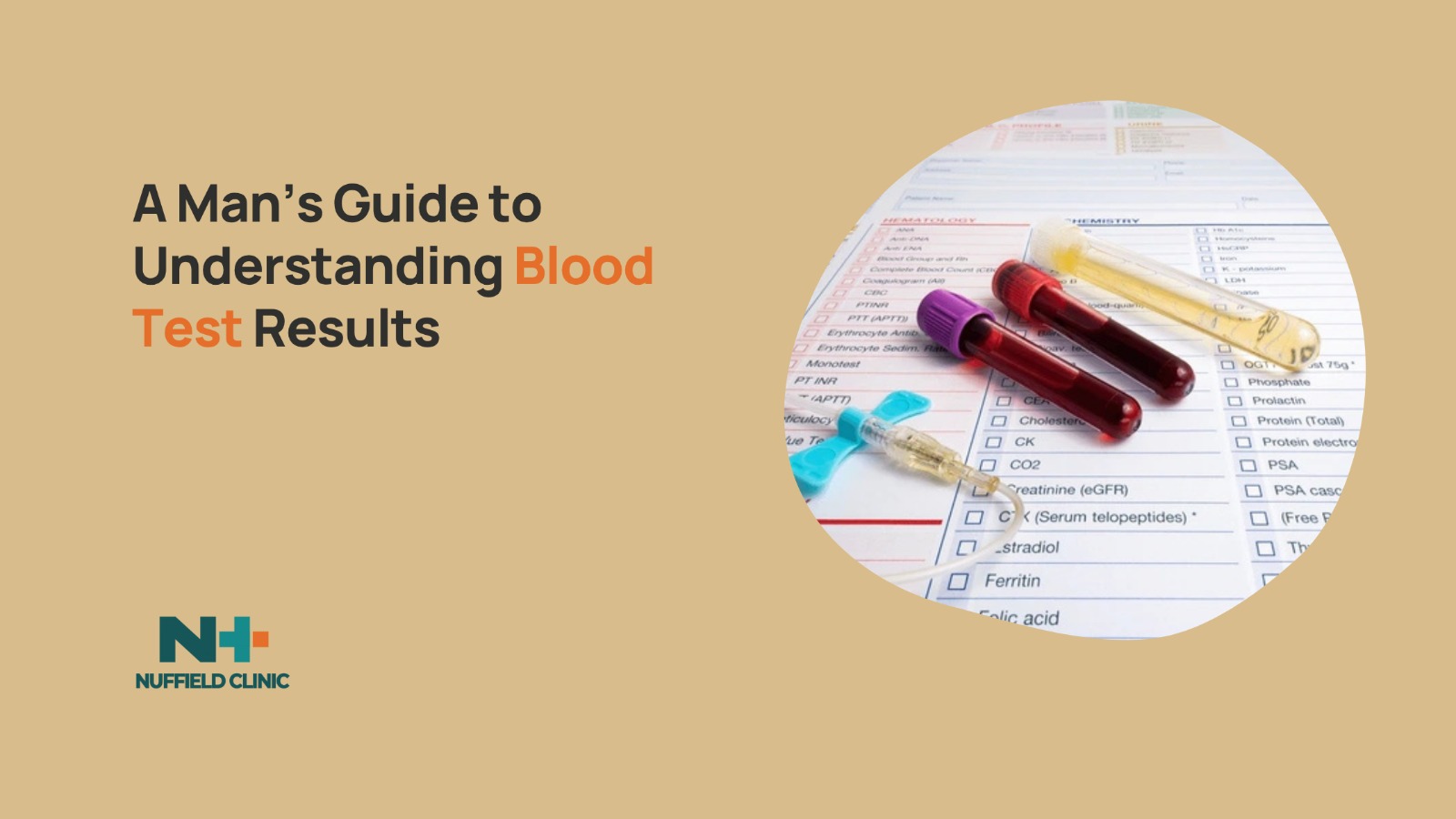A Man’s Guide to Understanding Blood Test Results

Blood tests are some of the most common tools used by healthcare professionals to monitor your health, detect early signs of disease, and keep your body running like a well-oiled machine. Think of them as a snapshot of what’s happening inside you, quietly, invisibly, long before symptoms appear. While receiving test results can be confusing or even a little worrying, understanding what those numbers mean can help you feel more in control of your health.
At Nuffield Clinic, we believe knowledge is power. That’s why our expert clinicians and advanced laboratories are here to help you make sense of your results and take meaningful steps toward better well-being.
Why Are Blood Tests Important for Men’s Health?
For men, especially over the age of 40, regular blood tests are not just mere routines. They’re a proactive way to detect changes that might signal health issues before they become serious. Blood tests might be ordered as part of a routine physical, to screen for conditions like diabetes or heart disease, or to investigate symptoms such as fatigue, weight changes, or low energy. They’re also essential for monitoring how well treatments are working or for tracking chronic conditions like high blood pressure or liver disease.
Sometimes, genetic blood tests are used to spot inherited conditions that could affect your long-term health. But it’s important to remember: blood test results aren’t diagnoses on their own. An abnormal value doesn’t necessarily mean something is wrong; it’s just a clue your doctor will consider along with other information.
What Are the Main Types of Blood Tests?
One of the most common and informative tests is the Complete Blood Count, or CBC. This measures several components in your blood, giving a full picture of how your body is functioning.
Red blood cells (RBCs) carry oxygen throughout your body. If your levels are too low, this could point to anaemia, often caused by iron or vitamin B12 deficiency, chronic disease, or even internal bleeding. If the count is too high, it could be due to dehydration, heart problems, or even a condition affecting your bone marrow. Some men living at high altitudes or who smoke might also see elevated RBC counts.
White blood cells (WBCs) help fight infections and support your immune system. A low count might mean your immune system is under strain or not functioning properly. A high count can indicate an infection, inflammation, or an allergic reaction. When a doctor asks for a “differential” in your CBC, they’re looking at the types of white cells, neutrophils, lymphocytes, monocytes, eosinophils, and basophils, each with its own role in protecting your health.
Your haemoglobin levels show how much oxygen-carrying protein is present in your red blood cells. Low levels often mean anaemia, while hematocrit, another marker, tells you what percentage of your blood is made up of red blood cells. If your hematocrit is low, it may suggest blood loss or a vitamin deficiency. High levels could be linked to dehydration or even early heart disease.
Platelets are tiny fragments that help your blood clot. If you have too few, you might bleed or bruise more easily. If you have too many, there’s a risk of forming unwanted blood clots, which can cause strokes or heart attacks. Abnormal platelet levels may be due to infection, cancer, autoimmune disorders, or problems with your bone marrow.
The CBC also looks at the size and colour of your red blood cells using measurements like MCV, MCH, and RDW. These help your doctor understand if your anaemia is caused by iron deficiency or by other conditions like folate or vitamin B12 deficiency.
What Do Metabolic Panels Reveal?
Another major set of tests includes Basic and Comprehensive Metabolic Panels, which look at how your organs, especially your liver and kidneys, are functioning. They also check your blood sugar, calcium levels, and electrolytes.
Blood sugar is vital to monitor because persistently high levels may point to diabetes or insulin resistance. If your sugar levels are consistently above normal, your doctor may also order an A1C test to see how your blood sugar has been doing over the past three months.
Electrolytes such as sodium, potassium, and chloride help your heart and muscles work properly. An imbalance can affect your heartbeat and cause weakness or confusion. If your levels are off, it might be due to dehydration, medications, or kidney issues.
Kidney function is assessed through Blood Urea Nitrogen (BUN) and creatinine. These are waste products that your kidneys usually filter out. If they build up in your blood, it may mean your kidneys are not working efficiently.
Liver tests measure enzymes like ALT, AST, and ALP, as well as proteins like albumin and bilirubin. High levels might suggest inflammation, blockages, gallstones, or liver damage from alcohol or medication.
Calcium, another mineral measured in metabolic panels, is crucial for strong bones, healthy nerves, and muscle contractions. Too much or too little can point to problems with your parathyroid glands or vitamin D levels.
Understanding Cholesterol and Heart Health
Lipid panels are blood tests that look at fat levels in your bloodstream, important indicators of your risk for heart disease and stroke.
Total cholesterol gives an overall picture, while LDL (“bad” cholesterol) tells you how much artery-clogging fat is present. High levels of LDL increase your risk of a heart attack and should be addressed through diet, exercise, or medication.
HDL (“good” cholesterol) helps clear LDL from your system. Higher levels of HDL are protective. Triglycerides, another type of fat, are influenced by what you eat and drink. High levels can lead to cardiovascular disease.
Other Blood Tests That Matter
The thyroid panel, which often includes TSH, Free T3, and Free T4, evaluates how well your thyroid gland is functioning. Since your thyroid helps regulate metabolism, heart rate, and energy, any imbalances here can cause fatigue, weight changes, and mood shifts.
Tests like CRP (C-reactive protein) and ESR (erythrocyte sedimentation rate) help detect inflammation in the body, which might be due to autoimmune conditions, chronic disease, or even early stages of cardiovascular disease.
Some blood tests are more specific. For instance, tumour markers can help detect or monitor certain cancers. The circulating tumour test looks for cancerous cells that have entered the bloodstream, often used for conditions like prostate, breast, or colon cancer.
Clotting tests, such as D-dimer and fibrinogen, assess whether your blood is clotting properly. These are essential for diagnosing risks like deep vein thrombosis or pulmonary embolism.
The Kappa and Lambda light chain tests help identify abnormal proteins in your blood, often used in the diagnosis of blood cancers like multiple myeloma.
The PSA (Prostate-Specific Antigen) test is particularly relevant for men, especially those over 50. Elevated levels can point to prostate inflammation, enlargement, or cancer.
Tests like Troponin and BNP are used in urgent care settings to detect heart muscle damage or heart failure. Arterial blood gas (ABG) analysis is used when checking oxygen and carbon dioxide levels in people with serious heart or lung conditions.
If you’re on blood thinners, the INR (International Normalised Ratio) test ensures your blood is not clotting too slowly or too quickly, which could lead to dangerous bleeding or clotting.
What to Expect Before and During a Blood Test
Some tests require fasting, usually 8 to 12 hours without food or drink (except water), to ensure accurate results. It’s always a good idea to ask your healthcare provider beforehand.
Hydrating well before your test and doing some light movement can help make the blood draw easier. The procedure is usually quick and performed by a trained phlebotomist, most commonly from a vein in your arm. It might feel like a brief pinch or sting.
If you feel anxious about needles or blood draws, try techniques like deep breathing, looking away, or using a distraction like music or conversation.
Interpreting Your Results with Confidence
Once your results come in, you’ll see a range of numbers often labelled “normal” or “reference range.” These are not hard rules, they vary slightly between labs and depend on the equipment used.
Don’t panic if something is flagged as “abnormal.” A slight deviation might not mean anything serious. What matters most is how your results fit into the bigger picture of your health, including symptoms, lifestyle, and personal or family medical history.
Hydration, medications, exercise, recent illness, alcohol, and even stress can all affect your blood test results. That’s why it’s crucial to go over your results with a healthcare provider who knows your health background.
For instance, at Nuffield Clinic, we don’t just hand you your results; we walk through them with you. Our labs are fully equipped to perform a wide range of tests with precision, and our team of health professionals will ensure you understand exactly what the results mean for your health, your future, and your goals.
Regular blood testing is one of the simplest and most powerful tools for keeping your health in check. Whether you’re dealing with fatigue, managing a condition like high blood pressure, or simply taking control of your long-term well-being, understanding your blood test results is a crucial step.
Book your comprehensive men’s health screening today at Nuffield Clinic.







